At the Washington State Criminal Justice Training Commission, we believe training grounded in experience, professionalism and compassion is essential to public safety. The Juvenile Corrections Officers Academy is where that belief becomes reality.
In this edition of Beyond the Badge, we highlight four recent JCOA graduates—each with a different life story but a shared mission: to support youth, uphold dignity and create safer communities. These officers entered the academy from vastly different paths. What unites them is their dedication to making a lasting impact.
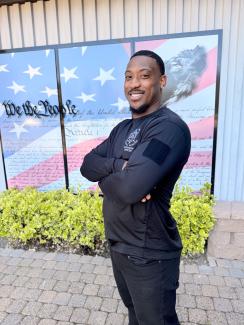
Darius Lemora: A mission seven years in the making
Darius Lemora grew up in Port Arthur, Texas, in a low-income neighborhood where opportunity was scarce and hardship was familiar. After earning a full football scholarship and graduating from Washington State University, he spent years searching for work that aligned with his purpose. “My real mission was to work with troubled youth,” he said. “It took me a few years—seven years after college—to find this job.”
Now a juvenile detention officer in Clark County, Lemora says he strives to help youth find their footing. “Giving them an extra milestone or an extra goal so that they will become greater in life—I think that’s the biggest milestone in this job, and that’s something that I am proud to give.” He sees his role as helping them understand that rules are there to protect them. “They still don’t believe in the law. They think they’re untouchable and think they’re going to live forever. You have to remind them.”
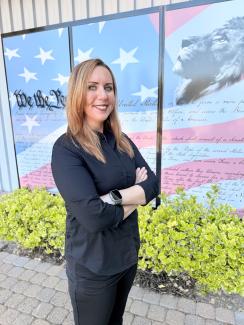
Kara Woods: Showing up, no matter what
After five years in the military, Kara Woods was medically retired with a 100% disability. A severe infection triggered an autoimmune disease that left her largely bedridden for years. Still, she searched for a way to serve again. “I wanted to be a police officer, but I knew it was out of reach,” she said. “But I wanted to do something in the public service sector.”
Today, Woods is a full-time juvenile detention officer in Thurston County. “It’s emotionally challenging at times, for sure. Every kid is different. We don’t get to pick and choose which kids are worth our time—we have to give 100%,” she said. “Whether they give 100% back is up to them. But we have to show up every single day and give them everything we have.”
Woods credits the WSCJTC JCOA experience with strengthening her ability to lead and connect. “I’m getting a lot more out of the classroom because it allows for so much conversation between so many different types of people,” she said. “Now I’m living in the moment and advocating for the kids I work with.”
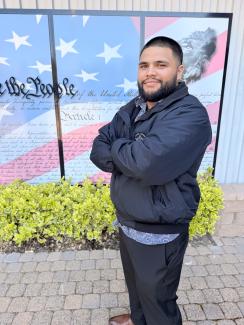
James Saoimanulua: Breaking cycles, building futures
James Saoimanulua grew up in San Jose, California, surrounded by gang culture and street violence. He joined a gang himself before deciding at 18 to leave that life behind and move to Vancouver, Washington. “I decided to make a career change and wanted to help youth who were in my shoes at one point,” he said. “They can make it—if I did.”
Saoimanulua said walking away from his old life wasn’t easy. “The temptation is there all the time,” he said. “But I got over the fear of saying no, and I say it more often now.”
Now working in Clark County juvenile detention, he said he already sees the impact. “I’ve only been in it for two and a half months, and I’ve seen the impact,” he said. “I love it here. In the future, I want to be a TAC officer.”
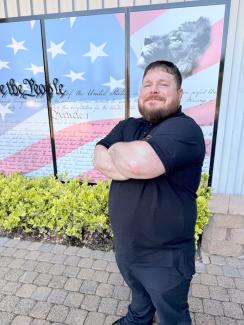
Ryan Jarbo: Recovery, resilience and real talk
Ryan Jarbo grew up in a working-class family in Aberdeen, where sports shaped much of his early identity. But a football injury in high school led to prescription drug use that spiraled into addiction. “It progressively got worse—a lot worse,” he said.
Twelve years ago, Jarbo found out he would be a father. “He probably saved my life,” he said. “I got clean and off everything.” Now working in Grays Harbor, Jarbo uses his experience to connect with youth facing similar struggles. “I try and live my life as I do what I say and say what I do,” he said. “In this industry, it’s working for me.”
He sees value in speaking openly with youth about the realities of addiction, especially with the rise of fentanyl. “It’s a hard way to go through life,” he said. “If I can get a few kids not to do it—or stop doing it—that’s worth it right there.”
Jarbo said the training at CJTC gave him the tools to match his life experience. “The TAC officers are very good—you can tell they know what they’re talking about,” he said. “It’s easy to learn from people like that because they love what they’re doing.”
Training that transforms
The Juvenile Corrections Officers Academy is an 80-hour training program that prepares corrections professionals to serve youth with empathy, professionalism and skill. Through scenario-based learning, legal instruction and trauma-informed practices, graduates are trained to lead with integrity and confidently de-escalate high-pressure situations.
Recruits strengthen their emotional intelligence, learn best communication practices, and build strong bonds with instructors and peers. The training prepares them not just to perform a role but to make a difference.
Graduated—and just getting started
Darius, Kara, James and Ryan recently graduated from the Juvenile Corrections Officers Academy and now serve in their respective communities. Each of them brings strength, purpose and perspective to the role. They are living examples of what it means to lead with character—and why the work of JCOA matters.
At WSCJTC, we don’t just train officers. We prepare professionals to uphold dignity, restore trust and support youth at the moments when it matters most.
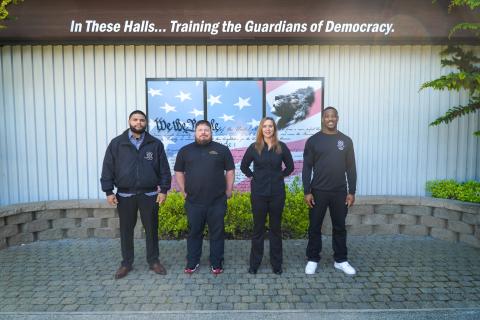
Learn more about JCOA and our approach to juvenile corrections training:
Juvenile Corrections Officers Academy | WSCJTC
Established in 1974, the Washington State Criminal Justice Training Commission sets training and certification standards for public safety professionals across Washington. Learn more at cjtc.wa.gov.
